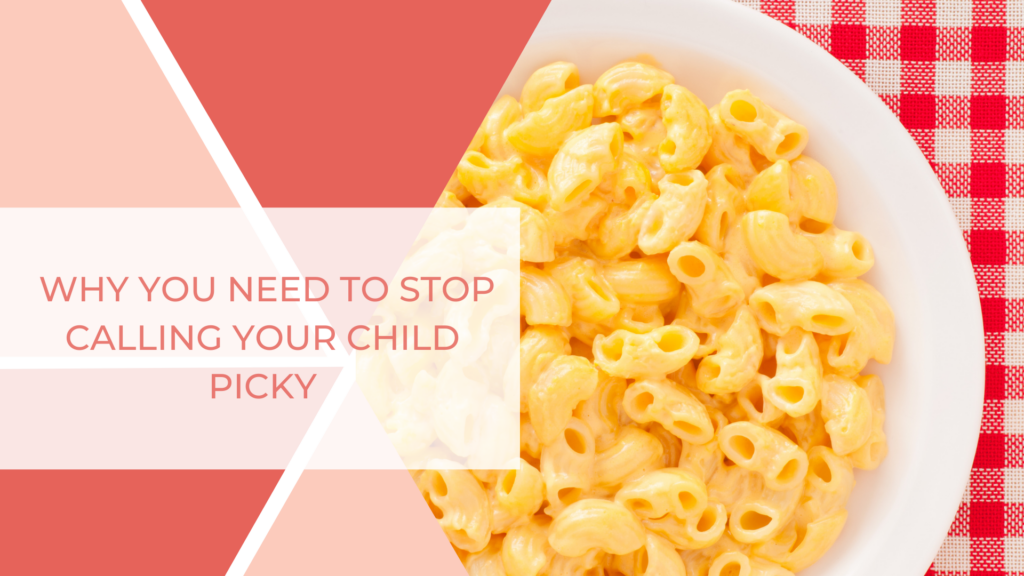This article discusses why you need to stop calling your child picky.

I use the term “picky” a lot. Picky eater. Picky eating. I’m saying them or typing them multiple times a day every day.
And I have a confession: I don’t feel good about it.
Picky eating is a term we all know. That’s why I use it. I want to speak your language. I want you to be able to find the support you need.
But here’s the thing: “picky” doesn’t capture the complexity of the eating challenges that many kids experience and it’s REALLY not helpful for kids to hear.
I’m working on making adjustments, so it’s not fair of me to ask this of you, but I’m going to anyway because it’s important: please stop calling your child picky.
Why You Need to Stop Calling Your Child Picky
Labeling your child as anything probably isn’t best practice. Our kids listen to us and take our opinions to heart. Who are we to define them?
“Picky” is limiting. As a label, it doesn’t have great implications and it locks your child into a box they’re not only not destined to be in, but that we don’t want them in anyway.
Hearing that they’re picky can communicate to your child that they are someone who doesn’t eat a lot of foods, who is maybe scared of new foods, and who doesn’t have a future of being anything different. It says “you don’t eat a lot of variety and I don’t expect you to.”
That’s not what you want for your child!
Furthermore, the label “picky” becomes a self-fulfilling prophecy. When a child hears they’re picky, they’re more likely to actually be picky.
What To Say Instead of “Picky”
I use the term “eating challenges” whenever I can instead of saying “picky.”
I’ve polled my Instagram community before about what they say. A lot of parents like selective, apprehensive, and still learning.
These are great terms for describing the types of eating struggles your child is experiencing. But I want you to avoid using these in front of your child for the same reasons why I want you to stop calling your child picky – it puts them into a box and reinforces the issue you’re trying to resolve.
Instead of using these terms to describe your child’s eating, focus on teaching your kids that they’re capable of growth and change. Their preferences and challenges aren’t fixed. They’re always evolving. There is a future (hopefully not too far away!) when things can be different.
Alternatives to “Picky”
What we say to our kids matters. Try to use language that prevents power struggles at the table and communicates to your child that one day they can learn to like new things.
Here are some phrases you can use to talk to your child about their eating when they’re struggling:
- You don’t like that yet
- You’re still learning
- That food is hard for you today
- You’re not ready to eat that yet. That’s okay.
- I’m here. I see you’re struggling. How can I help?
Why I Use The Term Picky Eater
I’m asking you to stop calling your child picky, yet I use the phrase all the time. I’m the first to admit that I have a double standard with this.
In my personal life, I’m careful about how I talk about food and eating in front of my toddler son. The truth is, he is getting pickier. And even though he only partially understands the things I say, I’m working hard not to use that term in front of him. He’s just changing. He will continue to. He’s learning and evolving.
In my professional life, I’m still using the term. A lot. You’ll find it here on my website and on social media.
Why? It’s easy. It’s a phrase that you understand and that we as a society are currently using.
I’m working on making changes – swapping in “kids with eating challenges” and “a child who struggles to eat” whenever I can.
Do you want to join me? While we’re working to resolve picky eating, we can work to find a more accurate and supportive term in the process.




0 Comments